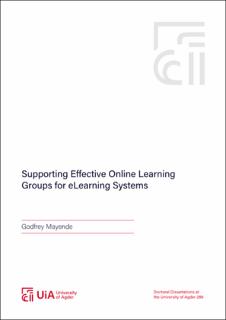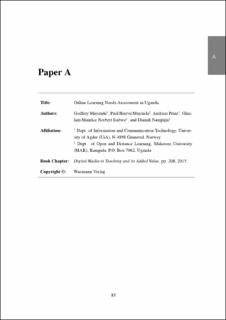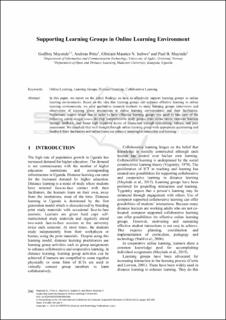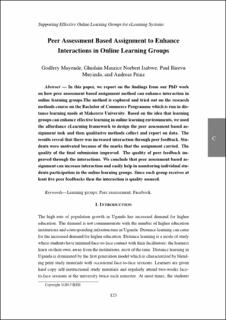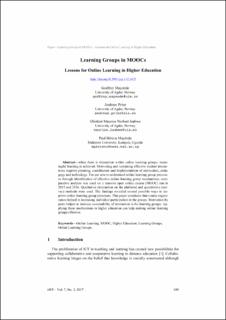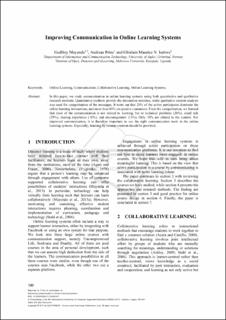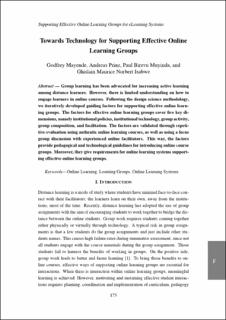| dc.contributor.advisor | Prinz, Andreas | |
| dc.contributor.author | Mayende, Godfrey | |
| dc.date.accessioned | 2020-10-19T12:16:37Z | |
| dc.date.available | 2020-10-19T12:16:37Z | |
| dc.date.created | 2020-08-27T10:05:46Z | |
| dc.date.issued | 2020 | |
| dc.identifier.citation | Mayende, G. (2020). Supporting Effective Online Learning Groups for eLearning Systems (Doctoral thesis). University of Agder, Kristiansand. | en_US |
| dc.identifier.isbn | 978-82-7117-988-5 | |
| dc.identifier.issn | 1504-9272 | |
| dc.identifier.uri | https://hdl.handle.net/11250/2683655 | |
| dc.description.abstract | Learning in groups has been advocated to increase learning based on the social constructivist learning theory. ICT has been preferred to bridge the gap between distance learning students for possibilities to enhance the benefits of learning groups.
However, although learning groups can bring about meaningful learning, learning groups in online environments are often not working. To solve this problem, this study uses design science approaches to establish methods and factors that support effective online learning groups. Within design science three case studies were used. These case studies were used under three research areas: context of online learning groups, processes to support effective online learning groups and tools to support effective online learning groups. The study adopted mixed methods in the evaluation stage of the adopted design science.
Establishing the context of online learning groups laid a foundation for this study. This was done using a survey approach that covered the five regions in Uganda, semi-structured interviews with experienced online learning facilitators and observation of interaction logs of online courses at both the University of Agder and Makerere University. Initially, preliminary findings of effective online learning groups were established. The preliminary findings consist of the need for: study guide, trained online tutors, motivating and sustaining interaction, high levels of cognitive interactions, peer assessment based activities and ICT.
From the context of online learning groups, the Methods and Factors for Effective Online Learning Groups (FEOLG) were established. FEOLG include: supporting institutional online learning group policy; supporting institutional online learning group technology; quality of online learning group activity; quality of the online learning group; and quality of online learning group facilitation. The factors were evaluated using online learning courses based on existing Makerere University eLearning Environment (MUELE) and online learning group design.
The thesis contributes: methods for creating online learning groups, methods for structuring online learning group activities, methods for facilitating online learning groups, and the establishment of factors for supporting effective online learning groups. | en_US |
| dc.language.iso | eng | en_US |
| dc.publisher | University of Agder | en_US |
| dc.relation.ispartofseries | Doctoral Dissertations at the University of Agder; no. 286 | |
| dc.relation.haspart | Paper I: Mayende, G. Birevu Muyinda, P., Prinz, A., Isabwe, G. M. N. & Nampijja, D. (2015). Online Learning Needs Assessment in Uganda. In D. F. Conway, A. S. Hillen, M. Landis, M. T. Schlegelmilch & P. Wolcott (Ed.), Digital Media in Teaching and its Added Value, (p. 208-224). Waxmann Verlag. Published version. Full-text is not available in AURA as a separate file. | en_US |
| dc.relation.haspart | Paper II: Mayende, G., Prinz, A., Isabwe, G. M. N. & Muyinda, P. B. (2015). Supporting Learning Groups in Online Learning Environment. In M. Helfert, M. Teresa Restivo, S. Zvacek & J. Uhomoibhi (Ed.), Proceedings of the 7th International Conference on Computer Supported Education (2, p. 390-396). Scitepress. https://doi.org/10.5220/0005433903900396. Published version. Full-text is available in AURA as a separate file. | en_US |
| dc.relation.haspart | Paper III: Mayende, G., Isabwe, G. M. N., Muyinda, P. B. & Prinz, A. (2015). Peer Assessment Based Assignment to Enhance Interactions in Online Learning Groups. In M. E. Auer (Ed.), Proceedings of 2015 International Conference on Interactive Collaborative Learning (p. 668-672). IEEE Press. https://doi.org/10.1109/ICL.2015.7318106. Author´s accepted manuscript. Full-text is available in AURA as a separate file. | en_US |
| dc.relation.haspart | Paper IV: Mayende, G., Prinz, A., Isabwe, G. M. N. & Muyinda, P. B. (2017). Learning Groups in MOOCs: Lessons for Online Learning in Higher Education. International Journal of Engineering Pedagogy, 7(2), 109-124. doi: https://doi.org/10.3991/ijep.v7i2.6925. Published version. Full-text is available in AURA as a separate file: http://hdl.handle.net/11250/2446666. | en_US |
| dc.relation.haspart | Paper V: Mayende, G., Prinz, A. & Isabwe, G. M. N. (2017). Improving Communication in Online Learning Systems. In P. Escudeiro, G. Costagliola, S. Zvacek, J. Uhomoibhi & B. M. McLaren (Ed.), Proceedings of the 9th International Conference on Computer Supported Education (1, p. 300-307). Scitepress. https://doi.org/10.5220/0006311103000307. Published version. Full-text is available in AURA as a separate file. | en_US |
| dc.relation.haspart | Paper VI: Mayende, G., Prinz, A., Birevu Muyinda, P. & Isabwe, G. M. N. (2018). Towards Technology for Supporting Effective Online Learning Groups. In M. E. Auer & T. Tsiatsis (Ed.), Interactive Mobile Communication Technologies and Learning (725, p. 361-371). Springer. https://doi.org/10.1007/978-3-319-75175-7_37. Author´s accepted manuscript. Full-text is available in AURA as a separate file. | en_US |
| dc.title | Supporting Effective Online Learning Groups for eLearning Systems | en_US |
| dc.type | Doctoral thesis | en_US |
| dc.description.version | publishedVersion | en_US |
| dc.rights.holder | © 2020 Godfrey Mayende | en_US |
| dc.subject.nsi | VDP::Teknologi: 500::Informasjons- og kommunikasjonsteknologi: 550 | en_US |
| dc.source.pagenumber | 188 | en_US |
| dc.source.issue | 286 | en_US |
| dc.identifier.cristin | 1825435 | |
